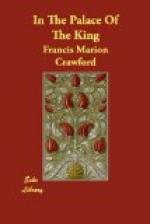at full speed after some unknown person. It would
be bad enough if she were recognized walking alone
at night at a distance from her own apartments.
She drew her veil over her face so closely that she
could hardly see her way, and began to retrace her
steps towards the principal staircase, pondering as
to what she should say to Mendoza when he discovered
that she had allowed his daughter to escape.
She was a woman of manlike intelligence and not easily
unbalanced by a single reverse, however, and before
she had gone far her mind began to work clearly.
Dolores, she reasoned, would do one of two things.
She would either go straight to Don John’s apartments,
wait for him, and then tell him her story, in the hope
that he would protect her, or she would go to the
Duchess Alvarez and seek protection there. Under
no circumstances would she go down to the throne room
without her court dress, for her mere appearance there,
dressed as she was, would produce the most profound
astonishment, and could do her no possible good.
And as for her going to the Duchess, that was impossible,
too. If she had run away from Dona Ana, she had
done so because the idea of not seeing Don John for
two days was intolerable, and she meant to try and
see him at once. The Duchess was in all probability
with the Queen, in the latter’s private apartments,
as Dolores would know. On the whole, it seemed
far more likely that she had done the rashest thing
that had suggested itself to her, and had gone directly
to the man she loved,—a man powerful enough
to protect her against all comers, at the present
time, and quite capable of facing even the King’s
displeasure.
But the whole object of Dona Ana’s manoeuvre
had been to get possession of Dolores’ person,
as a means of strongly influencing Don John’s
actions, in order thus to lead him into a false position
from which he should not be able to escape without
a serious quarrel with King Philip, which would be
the first step towards the execution of the plot elaborated
by Dona Ana and Perez together. Anything which
could produce an open difference between the brothers
would serve to produce two parties in Spain, of which
the one that would take Don John’s side would
be by far the stronger. His power would be suddenly
much increased, an organized agitation would be made
throughout the country to set him on the throne, and
his popularity, like Caesar’s, would grow still
more, when he refused the crown, as he would most
certainly do. But just then King Philip would
die suddenly of a fever, or a cold, or an indigestion,
as the conspirators thought best. There would
be no direct male heir to the throne but Don John
himself, the acknowledged son of the Emperor Charles;
and even Don John would then be made to see that he
could only serve his country by ruling it, since it
cried out for his rule and would have no other.
It was a hard and dangerous thing to lead King Philip;
it would be an easy matter to direct King John.




